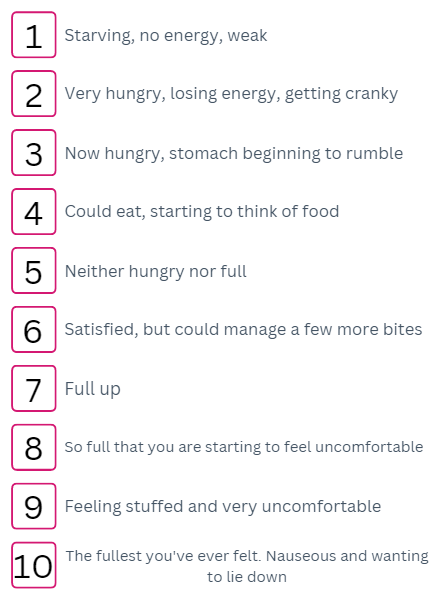When trying to lose weight, people often report increased hunger. This can be difficult to manage when trying to eat in a calorie deficit. Here are some tips to manage hunger so that you can feel fuller for longer while losing weight.
1. Eat breakfast
People live such busy lives that they often don’t prioritise breakfast and end up skipping it. This can lead to delayed hunger later in the day meaning people choose larger portion sizes at later meals or snack more. Aiming to have a balanced breakfast containing protein e.g. eggs, low fat yoghurt, smoked salmon or turkey sausages will really help you to manage your hunger levels throughout the day.
2. Eat Balanced Meals
Diet culture leads us to believe that we need to cut out food groups from our diet in order to lose weight e.g. carbs or fats. The truth is, we need a balance of food groups at meal times to help keep us full and give us the nutrition our body needs. Aim for each meal to contain a balance of protein, high fibre carbs, veg and healthy fats in order to get the most from your nutrition and stay fuller for longer.
3. Snack Savvy - Include fibre and protein
Protein and fibre help to keep us full and regulate our blood sugars. If you feel hungry in between meals, make sure your snacks includes a protein source plus a fibre source to help you get the most from your snack. Examples include: low fat Greek yoghurt (protein) + a piece of fruit (fibre) OR rye crackers (fibre) + cottage cheese (protein).
4. Stay Hydrated
If we are dehydrated, the feeling of thirst can sometimes be mistaken for the feeling of hunger. Make sure you aim for 2 litres of fluids per day and drink at regular intervals to help ensure your body isn’t confusing thirst for hunger.
5. Use the hunger scale
Hunger is a feeling and therefore can be subjective. Sometime people panic at the first sign of hunger and think “I’m starving”. Hunger is a natural physiological response and sometimes it might be ok to sit with feelings of hunger if they are not bothering you too much and your close to a meal time. On the other hand, you don’t want to allow yourself to become too hungry, as it can be more difficult to make choices around food types and appropriate portions. The Hunger Scale can be useful to determine what your levels of hunger are. You can also use this to help with fullness cues. Aim to be somewhere between 4-7.
The Hunger Scale
If you would like to book an appointment with a Spectrum Health dietitian to help with weight loss or managing hunger, please click here.
Written by: Hollie Corrigan, CORU Registered Dietitian with Spectrum Nutrition


